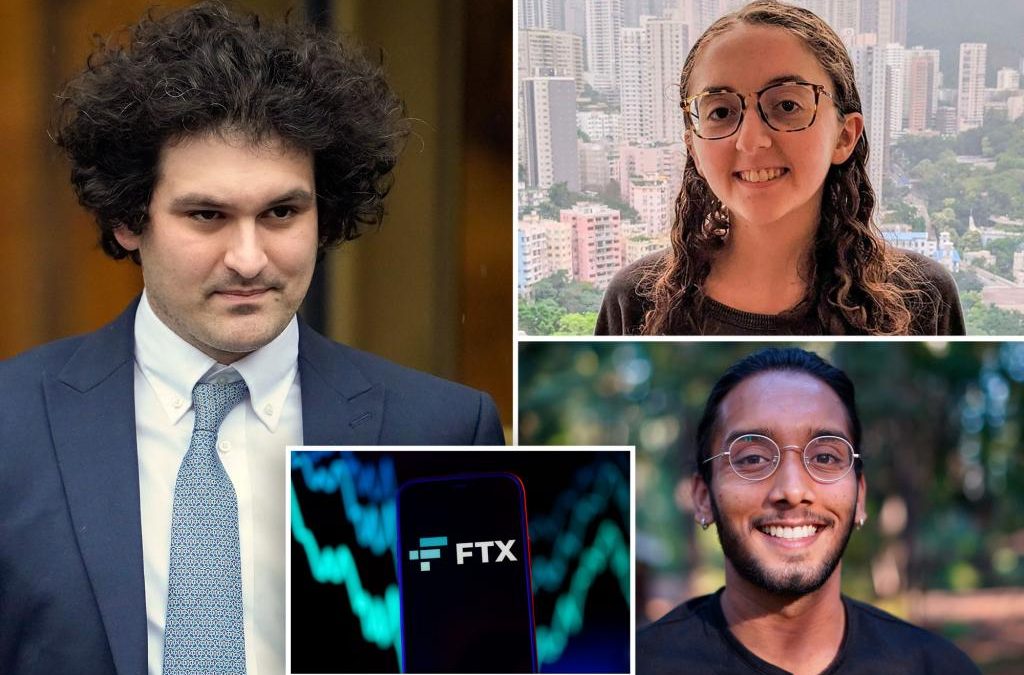Aditya Baradwaj can pinpoint the “exact moment” he knew the party was over for Sam Bankman-Fried and his once-booming FTX cryptocurrency empire.
The scruffy, 31-year-old crypto kingpin had showered workers like Baradwaj, a former software engineer at FTX’s sister firm Alameda Research, with a torrent of lavish perks throughout late 2021 and 2022 – only to plunge the $32 billion company into bankruptcy last November.
While awaiting word from their bosses last Nov. 9 on whether FTX would survive, Baradwaj and other staffers huddled in Alameda’s Hong Kong office tried to order takeout on a credit card — “probably a poke bowl or fried rice,” he said.
The transaction was declined.
“We ordered our lunch in the afternoon, same as usual,” Baradwaj told The Post. “When we went to order our food in the evening, the app says ‘credit card declined.’ That’s the moment where we realized, holy s—t, the company is probably broke.”
A few hours later, Caroline Ellison — CEO of Alameda Research and also Bankman-Fried’s ex-lover — surfaced for the first time in two days for a tense, tearful all-hands meeting that is now expected to play a pivotal role in a federal trial next month, where the disgraced FTX boss faces charges for allegedly stealing billions in customer funds.
“We were afraid,” Baradwaj said. “This thing was making international news. My friends and family were calling me, I’m getting all these calls. I’m sitting in a hotel in Hong Kong and I don’t want to get thrown in Chinese jail.”
Baradwaj, detailing his experience for the first time in an exclusive interview with The Post, was in the room with Ellison when she staged her now-infamous call with employees.
As those in the Hong Kong office sat in a circle around her, some perched on beanbags and others listening in by video conference, Ellison broke down in tears.
“I guess, mostly I wanna say, like, I’m sorry. This really sucks,” Ellison sobbed, according to court documents. “I think my current default plan is that Alameda will likely wind down once we can, like, repay all of our creditors and sort of wind down a bunch of our, like, whatever remaining obligations we have.”

One Alameda staffer asked Ellison, “Who made the decision on using [FTX] user deposits?” She is said to have responded, ““Um…Sam, I guess.”
After the meeting, Baradwaj said he and his stunned colleagues had to “literally book our flights and escape the country.” The next day, he resigned, bought a plane ticket home and left Hong Kong.
“Mr. Bankman-Fried maintains his innocence and looks forward to his day in court,” Bankman-Fried spokesperson Mark Botnick said in a statement.

Ellison’s legal team did not return The Post’s request for comment.
The first clear signs of serious financial trouble at FTX had emerged a week earlier on Nov. 2, when a leaked Alameda Research balance sheet raised questions about the empire’s solvency and ultimately sparked a flood of withdrawals, according to Baradwaj.
In the days before the meeting, the 28-year-old Ellison — now famed for her reported experimentation with polyamory and her love of “Harry Potter” — had issued a series of increasingly urgent messages demanding that Alameda’s traders pull capital from other exchanges to ensure FTX could meet withdrawals.
“Her tone when she said this had a kind of urgency that none of us had ever really seen in her before. We could tell that something was going on,” Baradwaj said. “We’ve never really had to drain capital off the exchanges that we trade on and effectively stop trading on them just to be able to do something else.”

Indeed, Baradwaj, who had been working alongside Ellison in Hong Kong at the time, said that until that point she had “seemed like a a kind person” and was a good manager. Ellison was “forgiving of mistakes,” and tried to make the company a “nice social environment,” according to Baradwaj.
“My opinion of Caroline — right up to the very end where she gave us this confession and told us what they’d been doing — my impression of here was that she as a good boss,” Baradwaj said. “She seemed like a kind person.”
Less than a week later on Nov. 8, staffers were blindsided by Bankman-Fried’s announcement on Twitter that rival platform Binance had offered to buy FTX to solve its “liquidity crunch.” Binance later backed out of the rescue deal.

On the day of the meeting, Baradwaj and other employees sat around the office “doing nothing,” lacking any available capital with which to trade or any guidance from Bankman-Fried and his inner circle on their next move.
“In my head, there was one central event, which is Caroline’s confession,” Baradwaj said.
“After that meeting, we all left the office and we never spoke to Caroline after that,” he added. “Caroline even tried to make conversation with someone and she was ignored. No one even wanted to talk to her.
“For Sam, that’s even more so,” he added.

FTX, Alameda and countless other affiliates filed for bankruptcy two days later on Nov. 11 – setting up the chain of events that ultimately led to Bankman-Fried’s arrest in the Bahamas and indictment on charges of securities fraud, money laundering and campaign-finance violations. He has pleaded not guilty.
“He’s definitely guilty,” said Baradwaj. “We know he’s guilty because Caroline basically said so, and this was back in mid-November, like in the heat of the moment, before she had talked to any lawyers, before the bankruptcy even. She confessed to us and there’s a recording of the confession.”
Source




